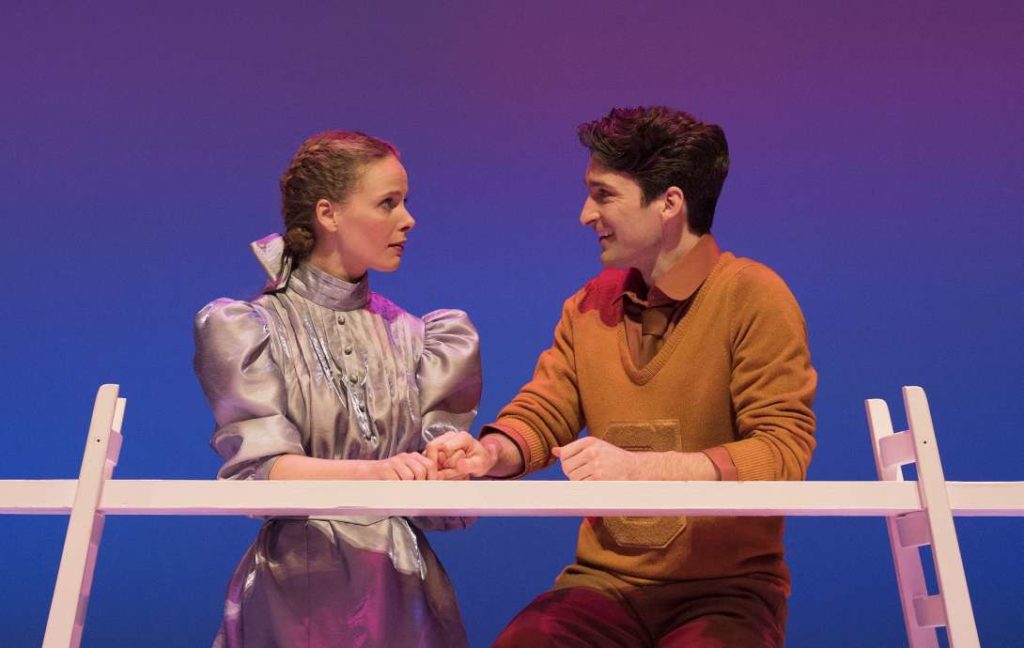From woeful Shakespearean sonnets to the wartime laments of ‘Les Mis’, theatre brings a plethora of dramatic monologues to the table. Kickstart your next audition by browsing this diverse selection of snippets from some of the most dynamic male characters onstage.
Here are 17 dramatic monologues for men:
1. “We can’t strike.” – Marius from ‘Les Misérables’

Spark a revolution with this one-minute monologue spoken by Victor Hugo’s Marius.
Monologue Length: 1:00 – 1:15
“We can’t strike. Why not? Because it’s against the law to strike! The king has declared that everything is a crime. Writing is a crime. Two weeks ago, the police destroyed the Galaty, the worker’s newspaper. They smashed the press. They burned over two thousand newspapers but that didn’t satisfy the king. Three days ago at a student meeting, a peaceful meeting, soldiers broke it up and arrested two of my friends. Writing, talking, going to class, speaking out is a crime. Being poor is a crime. Being poor is the worst crime of all. And if you commit these crimes, you are condemned for life. Our government has no mercy, no pity, no forgiveness. And there’s no work for us. And because there’s no work, our children are starving. Tell me: why are we powerless to save the people we love? All of you know. Tell me – why? The king betrayed us. We were promised the vote, do we have it? Do we have the vote? Where is the republic our fathers died for? It’s here my brothers. It lives here in our heads. But most of all, best of all, it’s here in our hearts. In our hearts – WE ARE THE REPUBLIC!”
2. “You wouldn’t understand yet, son…” – Walter Lee Younger from ‘A Raisin In The Sun’
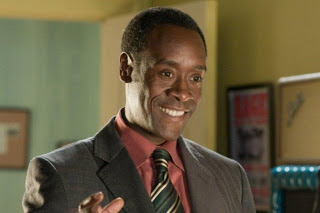
From one of the most acclaimed plays to date comes Walter Lee Younger’s iconic monologue. Walter is an ambitious dreamer who wants a better life for his family, untouched by poverty.
Monologue Length: 1:25 – 1:40
“You wouldn’t understand yet, son, but your daddy’s gonna make a transaction…a business transaction that’s going to change our lives…That’s how come one day when you ‘bout seventeen years old I’ll come home and I’ll be pretty tired, you know what I mean, after a day of conferences and secretaries getting things wrong the way they do…’cause an executive’s life is hell, man–And I’ll pull the car up on the driveway…just a plain black Chrysler, I think, with white walls–no–black tires. More elegant. Rich people don’t have to be flashy…though I’ll have to get something a little sportier for Ruth–maybe a Cadillac convertible to do her shopping in…And I’ll come up the steps to the house and the gardener will be clipping away at the hedges and he’ll say, “Good evening, Mr. Younger.” And I’ll say, “Hello, Jefferson, how are you this evening?” And I’ll go inside and Ruth will come downstairs and meet me at the door and we’ll kiss each other and she’ll take my are and we’ll go up to your room to see you sitting on the floor with the catalogues of all the great schools in America around you…All the great schools in the world! And–and I’ll say, all right son–it’s your seventeenth birthday, what is it you’ve decided?…just tell me where you want to go to school and you’ll go. Just tell me, what it is you want to be==Yessir! You just name it, son…and I hand you the world!”
3. “Well, as you guessed, Hope took over her father’s business…” – Officer Lockstock from ‘Urinetown’
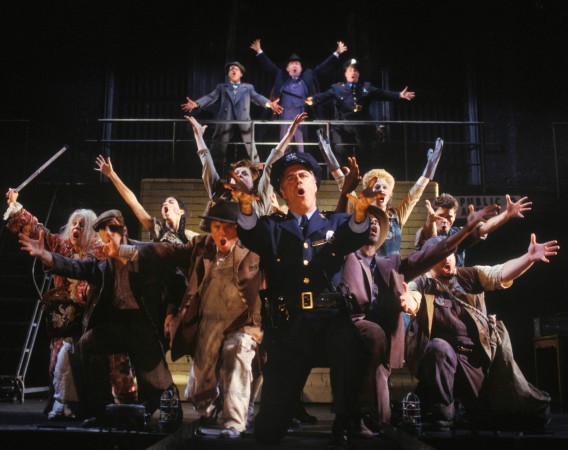
We think “urine” luck with Officer Lockstock’s animated ‘Urinetown’ monologue.
Monologue Length: 1:15 – 1:30
“Well, as you guessed, Hope took over her father’s business, instituting a series of reforms which opened the public bathrooms to all the people, to pee for free whenever they liked, as much as they liked, for as long as they liked, with whomever they liked. The UGC was renamed, “The Bobby Strong Memorial Toilet Authority” and was operated as a public trust for the benefit of the people. Of course, it wasn’t long before the water turned silty, brackish and then disappeared altogether. As cruel as Caldwell B. Cladwell was, his measures effectively regulated water consumption, sparing the town the same fate as the phantom Urinetown. Hope chose to ignore the warning signs, however, preferring to bask in the people’s love for as long as it lasted. If there is a next time I’m sure we can. Well, that’s our story. Hope eventually joined her father in a manner not quite so gentle. As for the people of this town? They did as best they could. But they were prepared for the world they inherited, weaned as they were on the legend born of their founding father’s scare tactics. For when the water dried up, they recognized their town for the first time for what it really was. What it was always waiting to be.”
4. “I’m just living in Berkeley.” – Benjamin Braddock from ‘The Graduate’
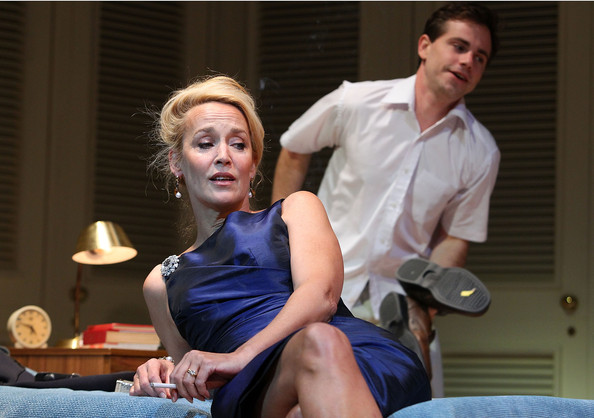
Full of angst and self-confliction, the popular story of Benjamin Braddock follows his affair with the older Mrs. Robinson and his romance with her daughter, Elaine.
Monologue Length: 0:45 – 1:00
“I’m just living in Berkeley. Having grown somewhat weary of family life, I’ve been meaning to stop by and pay my respects but have not been entirely certain how you felt about me after the incident with your mother which was certainly a serious mistake on my part but not serious enough I hope to permanently alter your feelings about me. I love you. I love you and I can’t help myself and I’m begging you to forgive me for what I did. I love you so much I’m terrified of seeing you every time I step outside the door. I feel helpless and hopeless and lost and miserable, please forget what I did please Elaine O God Elaine I love you please forget what I did? Please forget what I did Elaine, I love you.”
5. “All the world’s a stage…” – Jacques from ‘As You Like It’
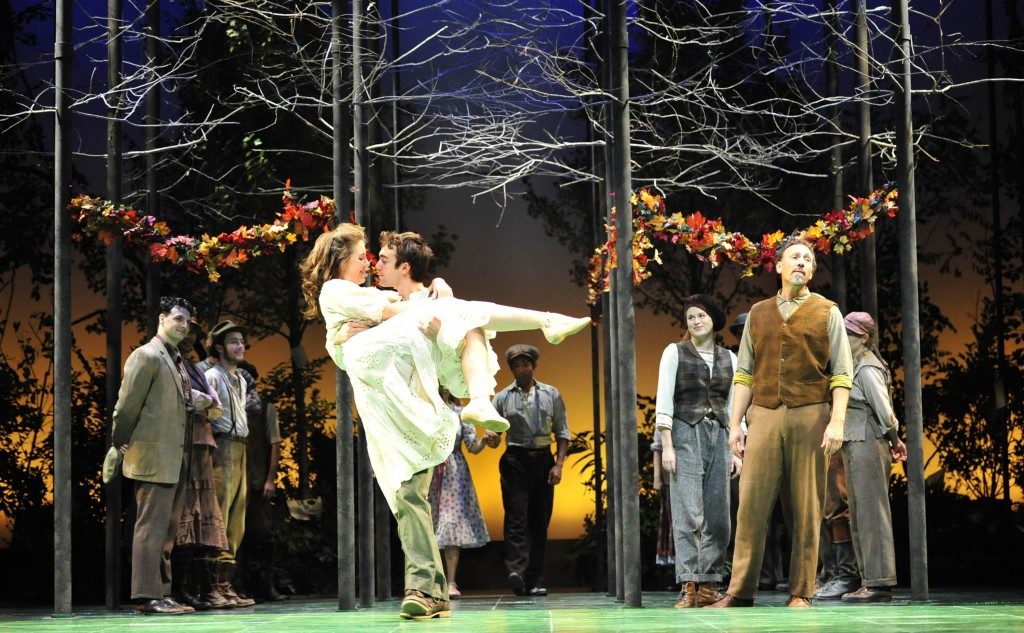
Perhaps one of the most memorable speeches in theatre history, Shakespeare’s “All the world’s a stage” stands the test of time. Bring your own unique voice to the role of Jacques with this monologue.
Monologue Length: 1:15 – 1:30
“All the world’s a stage,
And all the men and women merely players:
They have their exits and their entrances;
And one man in his time plays many parts,
His acts being seven ages. At first the infant,
Mewling and puking in the nurse’s arms.
And then the whining school-boy, with his satchel,
And shining morning face, creeping like snail
Unwillingly to school. And then the lover,
Sighing like furnace, with a woful ballad
Made to his mistress’ eyebrow. Then a soldier,
Full of strange oaths, and bearded like the pard,
Jealous in honour, sudden and quick in quarrel,
Seeking the bubble reputation
Even in the cannon’s mouth. And then the justice,
In fair round belly with good capon lin’d,
With eyes severe, and beard of formal cut,
Full of wise saws and modern instances;
And so he plays his part. The sixth age shifts
Into the lean and slipper’d pantaloon,
With spectacles on nose and pouch on side,
His youthful hose well sav’d, a world too wide
For his shrunk shank; and his big manly voice,
Turning again toward childish treble, pipes
And whistles in his sound. Last scene of all,
That ends this strange eventful history,
Is second childishness and mere oblivion,
Sans teeth, sans eyes, sans taste, sans everything.”
6. “A heavier task could not have been imposed…” – Egeon from ‘The Comedy Of Errors’

In the opening of this play by The Bard, Egeon wears his heart on his sleeve and tells the audience of his tragic past.
Monologue Length: Up to 2:50
“A heavier task could not have been imposed
Than I to speak my griefs unspeakable:
Yet, that the world may witness that my end
Was wrought by nature, not by vile offence,
I’ll utter what my sorrows give me leave.
In Syracusa was I born, and wed
Unto a woman, happy but for me,
And by me, had not our hap been bad.
With her I lived in joy; our wealth increased
By prosperous voyages I often made
To Epidamnum; till my factor’s death
And the great care of goods at random left
Drew me from kind embracements of my spouse:
From whom my absence was not six months old
Before herself, almost at fainting under
The pleasing punishment that women bear,
Had made provision for her following me
And soon and safe arrived where I was.”
[Full Monologue HERE]
7. “To be, or not to be–that is the question…” – Hamlet in ‘Hamlet’
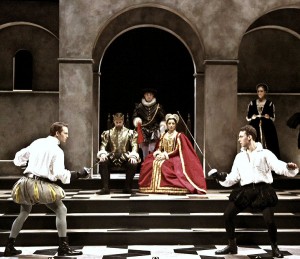
Hamlet’s infamous speech is sure to prove a worthwhile challenge for actors looking to take on a classic piece by Shakespeare.
Monologue Length: 1:30 – 1:45
“To be, or not to be–that is the question:
Whether ’tis nobler in the mind to suffer
The slings and arrows of outrageous fortune
Or to take arms against a sea of troubles
And by opposing end them. To die, to sleep–
No more–and by a sleep to say we end
The heartache, and the thousand natural shocks
That flesh is heir to. ‘Tis a consummation
Devoutly to be wished. To die, to sleep–
To sleep–perchance to dream: ay, there’s the rub,
For in that sleep of death what dreams may come
When we have shuffled off this mortal coil,
Must give us pause. There’s the respect
That makes calamity of so long life.
For who would bear the whips and scorns of time,
Th’ oppressor’s wrong, the proud man’s contumely
The pangs of despised love, the law’s delay,
The insolence of office, and the spurns
That patient merit of th’ unworthy takes,
When he himself might his quietus make
With a bare bodkin? Who would fardels bear,
To grunt and sweat under a weary life,
But that the dread of something after death,
The undiscovered country, from whose bourn
No traveller returns, puzzles the will,
And makes us rather bear those ills we have
Than fly to others that we know not of?
Thus conscience does make cowards of us all,
And thus the native hue of resolution
Is sicklied o’er with the pale cast of thought,
And enterprise of great pitch and moment
With this regard their currents turn awry
And lose the name of action. — Soft you now,
The fair Ophelia! — Nymph, in thy orisons
Be all my sins remembered.”
8. “Is this a dagger which I see before me…” Macbeth in ‘Macbeth’
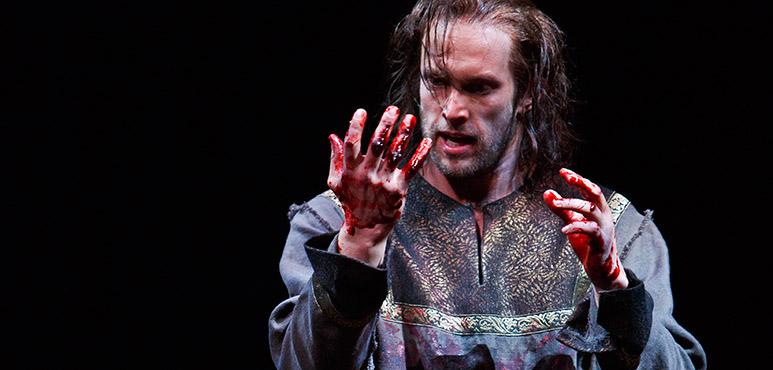
Enter The Scottish Play – a story filled with intensity and anguish. Step into the shoes of this acclaimed role and slay your next dramatic monologue.
Monologue Length: 1:30 – 1:45
“Is this a dagger which I see before me,
The handle toward my hand? Come, let me clutch thee.
I have thee not, and yet I see thee still.
Art thou not, fatal vision, sensible
To feeling as to sight? or art thou but
A dagger of the mind, a false creation,
Proceeding from the heat-oppressed brain?
I see thee yet, in form as palpable
As this which now I draw.
Thou marshall’st me the way that I was going;
And such an instrument I was to use.
Mine eyes are made the fools o’ the other senses,
Or else worth all the rest; I see thee still,
And on thy blade and dudgeon gouts of blood,
Which was not so before. There’s no such thing:
It is the bloody business which informs
Thus to mine eyes. Now o’er the one halfworld
Nature seems dead, and wicked dreams abuse
The curtain’d sleep; witchcraft celebrates
Pale Hecate’s offerings, and wither’d murder,
Alarum’d by his sentinel, the wolf,
Whose howl’s his watch, thus with his stealthy pace.
With Tarquin’s ravishing strides, towards his design
Moves like a ghost. Thou sure and firm-set earth,
Hear not my steps, which way they walk, for fear
Thy very stones prate of my whereabout,
And take the present horror from the time,
Which now suits with it. Whiles I threat, he lives:
Words to the heat of deeds too cold breath gives.
[A bell rings]
I go, and it is done; the bell invites me.
Hear it not, Duncan; for it is a knell
That summons thee to heaven or to hell.”
9. “But soft! What light through yonder window breaks?” – Romeo from ‘Romeo And Juliet’
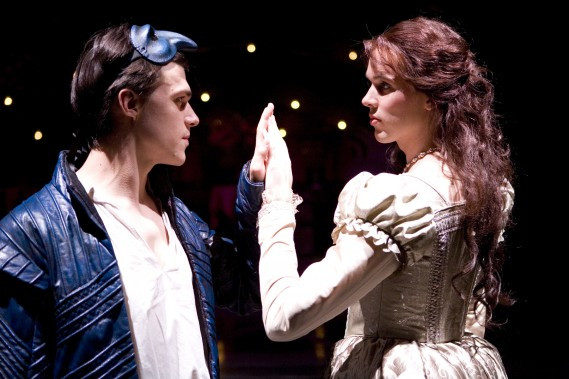
If it’s a declaration of love that strikes your fancy, choose this monologue from the one of the most romantic (and tragic) love stories of all time.
Monologue Length: 1:00 – 1:10
“But soft! What light through yonder window breaks?
It is the East, and Juliet is the sun!
Arise, fair sun, and kill the envious moon,
Who is already sick and pale with grief
That thou her maid art far more fair than she.
Be not her maid, since she is envious.
Her vestal livery is but sick and green,
And none but fools do wear it. Cast it off.
It is my lady; O, it is my love!
O that she knew she were!
She speaks, yet she says nothing. What of that?
Her eye discourses; I will answer it.
I am too bold; ’tis not to me she speaks.
Two of the fairest stars in all the heaven,
Having some business, do entreat her eyes
To twinkle in their spheres till they return.
What if her eyes were there, they in her head?
The brightness of her cheek would shame those stars
As daylight doth a lamp; her eyes in heaven
Would through the airy region stream so bright
That birds would sing and think it were not night.
See how she leans her cheek upon her hand!
O that I were a glove upon that hand,
That I might touch that cheek!”
10. “Under the cool shade of a sycamore…” – Boyet from ‘Love’s Labour’s Lost’
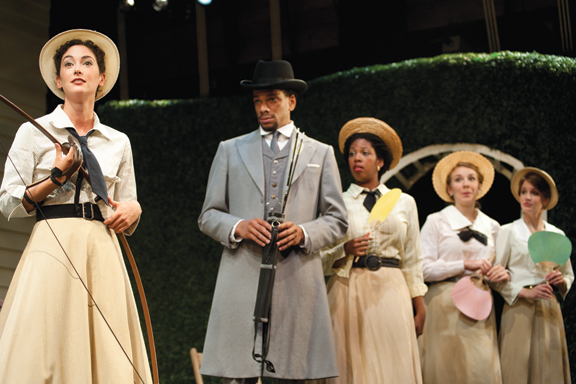
This eloquent speech brings to life the role of Boyet, assistant to the princess in ‘Love’s Labour’s Lost’.
Monologue Length: 1:20 – 1:35
“Under the cool shade of a sycamore
I thought to close mine eyes some half an hour;
When, lo! to interrupt my purposed rest,
Toward that shade I might behold addrest
The king and his companions: warily
I stole into a neighbour thicket by,
And overheard what you shall overhear,
That, by and by, disguised they will be here.
Their herald is a pretty knavish page,
That well by heart hath conn’d his embassage:
Action and accent did they teach him there;
‘Thus must thou speak,’ and ‘thus thy body bear:’
And ever and anon they made a doubt
Presence majestical would put him out,
‘For,’ quoth the king, ‘an angel shalt thou see;
Yet fear not thou, but speak audaciously.’
The boy replied, ‘An angel is not evil;
I should have fear’d her had she been a devil.’
With that, all laugh’d and clapp’d him on the shoulder,
Making the bold wag by their praises bolder:
One rubb’d his elbow thus, and fleer’d and swore
A better speech was never spoke before;
Another, with his finger and his thumb,
Cried, ‘Via! we will do’t, come what will come;’
The third he caper’d, and cried, ‘All goes well;’
The fourth turn’d on the toe, and down he fell.
With that, they all did tumble on the ground,
With such a zealous laughter, so profound,
That in this spleen ridiculous appears,
To cheque their folly, passion’s solemn tears.”
11. “Mankind marches on…” – Peter Trofimov from ‘The Cherry Orchard’
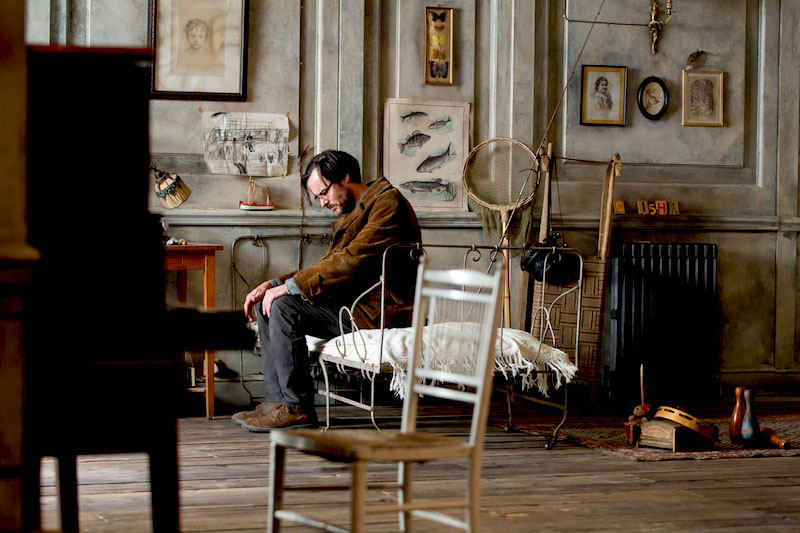 Peter, an intellectual with an often pretentious nature, sheds light on his views with “Mankind marches on…”
Peter, an intellectual with an often pretentious nature, sheds light on his views with “Mankind marches on…”
Monologue Length: 1:30 – 1:45
“Mankind marches on, going from strength to strength. All that now eludes us will one day be well within our grasp, but, as I say, we must work and we must do all we can for those who are trying to find the truth. Here in Russia very few people do work at present. The kind of Russian intellectuals I know, far and away the greater part of them anyway, aren’t looking for anything. They don’t do anything. They still don’t know the meaning of hard work. They call themselves an intelligensia, but they speak to their servants as inferiors and treat the peasants like animals. They don’t study properly, they never read anything serious, in fact they don’t do anything at all. Science is something they just talk about and they know precious little about art. Oh, they’re all very earnest. They all go round looking extremely solemn. They talk of nothing but weighty issues and they discuss abstract problems, while all the time everyone knows the workers are abominably fed and sleep without proper bedding, thirty or forty to a room–with bed-bugs everywhere, to say nothing of the stench, the damp, the moral degradation. And clearly all our fine talk is just meant to pull wool over our own eyes and other people’s too. Tell me, where are those children’s creches that there’s all this talk about? Where are the libraries? They’re just things people write novels about, we haven’t actually got any of them. What we have got it dirt, vulgarity and squalor. I loathe all those earnest faces. They scare me, and so do earnest conversations. Why can’t we keep quiet for a change?”
12. “Yes, I have tricks in my pocket, I have things up my sleeve.” – Tom Wingfield from ‘The Glass Menagerie’
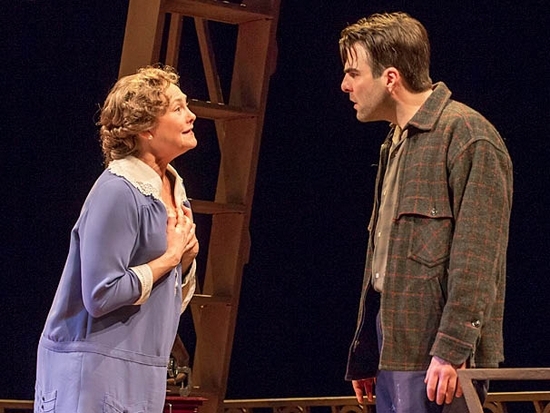
‘The Glass Menagerie’ opens with this monologue by Tom Wingfield, the narrator of the story.
Monologue Length: Up to 2:00
“Yes, I have tricks in my pocket, I have things up my sleeve. But I am the opposite of a stage magician. He gives you illusion that has the appearance of truth. I give you truth in the pleasant disguise of illusion. To begin with, I turn bark time. I reverse it to that quaint period, the thirties, when the huge middle class of America was matriculating in a school for the blind. Their eyes had failed them or they had failed their eyes, and so they were having their fingers pressed forcibly down on the fiery Braille alphabet of a dissolving economy. In Spain there was revolution. Here there was only shouting and confusion. In Spain there was Guernica. Here there were disturbances of labour, sometimes pretty violent, in otherwise peaceful cities such as Chicago, Cleveland, Saint Louis. . . . This is the social background of the play. The play is memory. Being a memory play, it is dimly lighted, it is sentimental, it is not realistic. In memory everything seems to happen to music. That explains the fiddle in the wings. I am the narrator of the play, and also a character in it. The other characters are my mother Amanda, my sister Laura and a gentleman caller who appears in the final scenes. He is the most realistic character in the play, being an emissary from a world of reality that we were somehow set apart from. But since I have a poet’s weakness for symbols, I am using this character also as a symbol; he is the long-delayed but always expected something that we live for. There is a fifth character in the play who doesn’t appear except in this larger-than-life-size photograph over the mantel. This is our father who left us a long time ago.He was a telephone man who fell in love with long distances; he gave up his job with the telephone company and skipped the light fantastic out of town. . . .The last we heard of him was a picture postcard from Mazatlan, on the Pacific coast of Mexico, containing a message of two words – ‘Hello – Good-bye!’ and no address. I think the rest of the play will explain itself …”
13. “Try and calm yourself, and make your mind easy again…” – Torvald Helmer from ‘A Doll’s House’
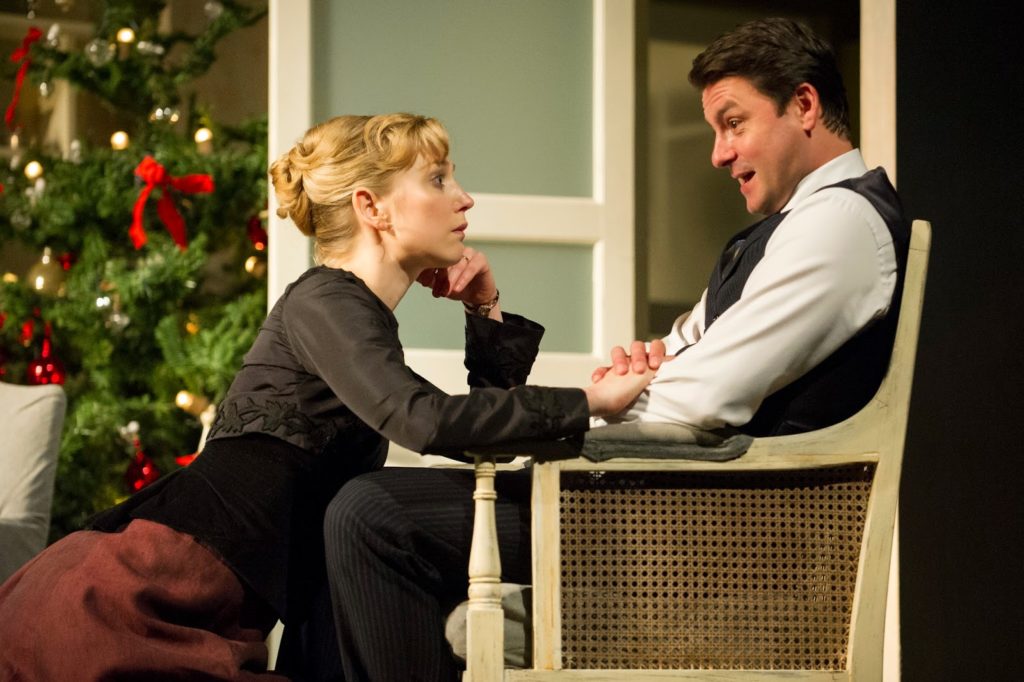
Torvald comforts his wife, Nora, in this snippet from Henrik Ibsen’s play, ‘A Doll’s House.’
Monologue Length: 1:20 – 1:45
“Try and calm yourself, and make your mind easy again, my frightened little singing-bird. Be at rest, and feel secure; I have broad wings to shelter you under. [Walks up and down by the door.] How warm and cosy our home is, Nora. Here is shelter for you; here I will protect you like a hunted dove that I have saved from a hawk’s claws; I will bring peace to your poor beating heart. It will come, little by little, Nora, believe me. Tomorrow morning you will look upon it all quite differently; soon everything will be just as it was before. Very soon you won’t need me to assure you that I have forgiven you; you will yourself feel the certainty that I have done so. Can you suppose I should ever think of such a thing as repudiating you, or even reproaching you? You have no idea what a true man’s heart is like, Nora. There is something so indescribably sweet and satisfying, to a man, in the knowledge that he has forgiven his wife–forgiven her freely, and with all his heart. It seems as if that had made her, as it were, doubly his own; he has given her a new life, so to speak; and she has in a way become both wife and child to him. So you shall be for me after this, my little scared, helpless darling. Have no anxiety about anything, Nora; only be frank and open with me, and I will serve as will and conscience both to you–. What is this? Not gone to bed? Have you changed your things?”
14. “Oh, Miss Julie, a dog may lie on the couch of a Countess…” – Jean from ‘Miss Julie’
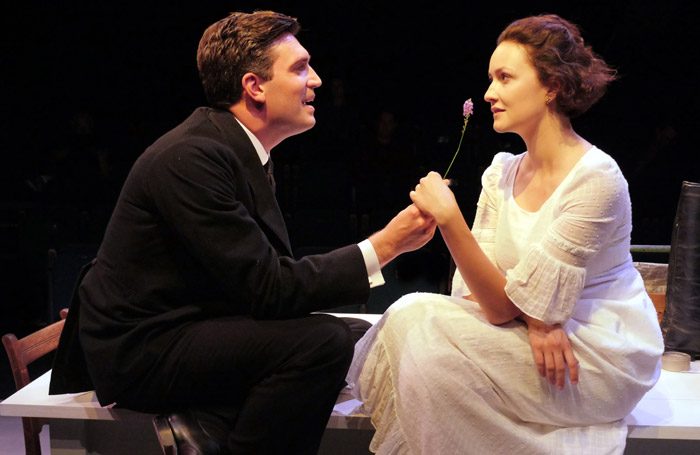
Jean’s complex character first appears one way to Miss Julie, the play’s protagonist, before showing his true colors.
Monologue Length: 1:15 – 1:25
“Oh, Miss Julie, a dog may lie on the couch of a Countess, a horse may be caressed by a lady’s hand, but a servant—yes, yes, sometimes there is stuff enough in a man, whatever he be, to swing himself up in the world, but how often does that happen! But to return to the story, do you know what I did? I ran down to the mill dam and threw myself in with my clothes on—and was pulled out and got a thrashing. But the following Sunday when all the family went to visit my grandmother I contrived to stay at home; I scrubbed myself well, put on my best clothes, such as they were, and went to church so that I might see you. I saw you. Then I went home with my mind made up to put an end to myself. But I wanted to do it beautifully and without pain. Then I happened to remember that elderberry blossoms are poisonous. I knew where there was a big elderberry bush in full bloom and I stripped it of its riches and made a bed of it in the oat-bin. Have you ever noticed how smooth and glossy oats are? As soft as a woman’s arm.—Well, I got in and let down the cover, fell asleep, and when I awoke I was very ill, but didn’t die—as you see. What I wanted—I don’t know. You were unattainable, but through the vision of you I was made to realize how hopeless it was to rise above the conditions of my birth.”
15. “I’m celebrating because I’ve got a friend who tells me all the things that ought to be told me.” – George Gibbs from ‘Our Town’
Thornton Wilder’s beloved ‘Our Town’ chronicles the story of one town, Grover’s Corner, and the families that encompass the community. George Gibbs is an all-American boy navigating family, school, love for Emily, and growing up.
Monologue Length: 0:45 – 1:00
“I’m celebrating because I’ve got a friend who tells me all the things that ought to be told me. I’m glad you spoke to me like you did. But you’ll see. I’m going to change. And Emily, I want to ask you a favor. Emily, if I go away to State Agricultural College next year, will you write me a letter? The day wouldn’t come when I wouldn’t want to know everything about our town. Y’ know, Emily, whenever I meet a farmer I ask him if he thinks it’s important to go to Agricultural School to be a good farmer. And some of them say it’s even a waste of time. And like you say, being gone all that time – in other places, and meeting other people. I guess new people probably aren’t any better than old ones. Emily – I feel that you’re as good a friend as I’ve got. I don’t need to go and meet the people in other towns. Emily, I’m going to make up my mind right now – I won’t go. I’ll tell Pa about it tonight.”
16. “Why do you got to get killed?” – Lennie Small from ‘Of Mice And Men’
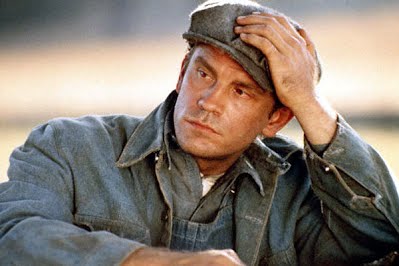
Known for his kind heart and loyalty, Lennie struggles with accepting that he has accidentally killed a puppy given to him by his friend, George.
Monologue Length: 1:00 – 1:15
“Why do you got to get killed? You ain’t so little as mice. I didn’t bounce you so hard. (bends pup’s head up and looks in its face) Now may be George ain’t gonna let me tend no rabbits if he finds out you got killed. (Scoops a little hollow and lays puppy in it out of sight and covers it over with hay. He stares at the mound he has made.) I’ll tell George I found it dead. (unburies pup and inspects it. Twists its ears and works his fingers in its fur, sorrowfully) But he’ll know. George always knows. He’ll say: “You done it. Don’t try to put nothin’ over on me.” And he’ll say: “Now just for that you don’t get to tend no ‐‐‐ you know whats.” (his anger rises. Addresses pup) Damn you. Why do you got to get killed? You ain’t so little as mice. (picks up pup and hurls it from him, turns his back on it. Sits bent over his knees, moaning to himself.) Now he won’t let me…Now he won’t let me. You wasn’t big enough. They tole me and tole me you wasn’t. I didn’t know you’d get killed so easy. Maybe George won’t care. This here pup wasn’t nothin’ to George.”
17. “What can I do? I’m a patsy, what can a patsy do?” – Eddie Carbone from ‘A View From The Bridge’
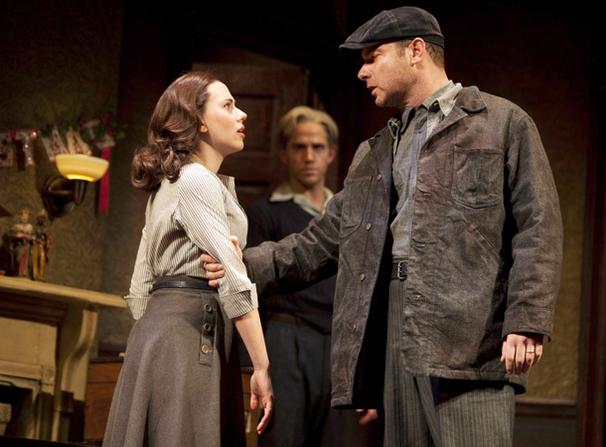
Though well intentioned, Eddie Carbone struggles to stay afloat in the real world as he lets himself slowly fall into a delusional state of mind in ‘A View From The Bridge.’
Monologue Length: 0:45 – 1:00
“What can I do? I’m a patsy, what can a patsy do? I worked like a dog twenty years so a punk could have her, so that’s what I done. I mean, in the worst times, in the worst, when there wasn’t a ship comin’ in the harbor, I didn’t stand around lookin’ for relief—I hustled. When there was empty piers in Brooklyn, I went to Hoboken, Staten Island, the West Side, Jersey all over—because I made a promise. I took out of my own mouth to give to her. I took out of my wife’s mouth. I walked hungry plenty days in this city! (It begins to break through.) And now I gotta sit in my own house and look at a son-of-a-bitch punk like that—which he came out of nowhere! I give him my house to sleep! I take the blankets off my bed for him, and he takes and puts his dirty filthy hands on her like a goddam thief!”





